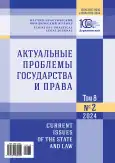On the issue of F.F. Kokoshkin’s participation in the Vyborg Manifesto on July 10, 1906
- Authors: MITROFANOV N.V.1
-
Affiliations:
- Derzhavin Tambov State University
- Issue: Vol 8, No 2 (2024)
- Pages: 218-224
- Section: General Theory and History of Law and the State
- URL: https://journal-vniispk.ru/2587-9340/article/view/299470
- ID: 299470
Cite item
Abstract
One of the most controversial events in the history of Russian parliamentarism is analyzed. The motives for the Vyborg Manifesto are clarified. The stages preceding the signing and publication of the text of the document are studied. The aim is to clarify the role and significance of participation in the Vyborg Manifesto by F.F. Kokoshkin, who was one of the significant public and political figures of that time. The consequences of this event are noted, affecting both the jurist himself and those that influenced the history of the development of domestic constitutionalism. The following research methods are used: historical-legal, formal-legal and comparative-legal approaches of scientific cognition. As a result of the conducted research, the main reasons that served as the basis for the appeal of a group of former deputies to the people are identified. It is noted that the demands were of a radical nature and included calls for a boycott of the government in the form of refusal to pay taxes, replenishment of the army and recognition of loans. The process of creating the text itself took place in multi-stages, starting with the drafting of the appeal in St. Petersburg and ending with a full-fledged discussion in Vyborg. The result of the appeal did not justify itself, there was no popular unrest. F.F. Kokoshkin played a significant role in drafting the text of the appeal to the people and subsequently repeatedly defended his position. After the trial, the lawyer was sentenced to three months in prison, deprived of all voting rights and expelled from the Moscow nobility. The Vyborg Manifesto became a precedent in passive resistance to the authorities.
About the authors
Nikita V. MITROFANOV
Derzhavin Tambov State University
Author for correspondence.
Email: naiketmitro98@mail.ru
ORCID iD: 0000-0002-5541-0483
Post-Graduate Student, Theory and History of State and Law Department, Lecturer and Assistant of Civil and Arbitration Procedure Department of Law and National Security Institute
Russian Federation, 33 Internatsionalnaya St., Tambov, 392000, Russian FederationReferences
- Matyukhin A.V. (2022). Russian Liberals and Duma Parliamentarism the beginning of the 20th century. Sotsial’no-gumanitarnye znaniya = Social and Humanitarian Knowledge, no. 1, pp. 182-190. (In Russ.) https://doi.org/10.34823/SGZ.2022.1.51758, https://elibrary.ru/pevzxz
- Solov’ev K.A. (2019). Samoderzhavie i konstitutsiya. Politicheskaya povsednevnost’ v 1906–1917 godakh [Autocracy and the Constitution. Political Daily Life in 1906–1917]. Moscow, New Literary Observer Publ., 345 p. (In Russ.) https://elibrary.ru/xscubw
- Smirnov A.F. (2021). Gosudarstvennaya duma Rossiiskoi imperii 1906–1917 gg.: Istoriko-pravovoi ocherk [State Duma of the Russian Empire 1906–1917: Historical and Legal Essay]. Moscow, Centerpolygraph Publ., 719 p. (In Russ.)
- Kolotova A.S. (2015). «Vyborgskoe vozzvanie» i konstitutsionno-demokraticheskaya partiya [“Vyborg Manifesto” and the Constitutional Democratic Party]. Materialy Mezhdunarodnoi (zaochnoi) nauchno-prakticheskoi konferentsii «Nauka v sovremennom mire» [Proceedings of the International (Correspondence) Scientific and Practical Conference “Science in the Modern World”]. Neftekamsk, Scientific Publishing Center “World of Science” (SP Vostretsov Alexander Ilyich), pp. 121-125. (In Russ.) https://elibrary.ru/xsmihv
- Russ M.D. (2022). Rol’ i mesto partii konstitutsionnykh demokratov v obshchestvenno-politicheskoi zhizni Rossiiskoi imperii v 1905–1917 gg. [The role and place of the Party of Constitutional Democrats in the socio-political life of the Russian Empire in 1905–1917]. Osnovnye tendentsii gosudarstvennogo i obshchestvennogo razvitiya Rossii: istoriya i sovremennost’ [The Main Trends in the State and Social Development of Russia: History and Modernity]. Khabarovsk, no 1, pp. 3-8. (In Russ.) https://elibrary.ru/bihytm
- Solov’ev K.A. (2020). Vyborgskoe vozzvanie. Teoriya passivnogo soprotivleniya. Sbornik nauchnykh statei Mezhdunarodnoi nauchnoi konferentsii «Tavricheskie chteniya 2019. Aktual’nye problemy parlamentarizma: istoriya i sovremennost’»: in 2 ch. [Collection of Scientific Works of International Scientific Conference “Tauride Readings 2019. Current Issues of Parliamentarism: History and Modernity”: in 2 pts]. St. Petersburg, Scientific and Information Technologies Center “Asterion”, pt 1, pp. 224-235. (In Russ.) https://elibrary.ru/otgcbg
- Selunskaya N.B. (2023). The images of “Russian voter” and “People’s deputies” in the discursive practices of the early twentieth century. Vestnik Moskovskogo universiteta. Seriya 8: Istoriya = Moscow University Bulletin. Series 8: History, no. 2, pp. 57-74. (In Russ.) https://doi.org/10.55959/MSU0130-0083-8-2023-64-2-57-74, https://elibrary.ru/tcnzmt
- Uporov I.V. (2022). Features of the Russian criminal and political legalproceedings in the beginning of the 20th century (by the example of the Vyborg case). Teoriya prava i mezhgosudarstvennykh otnoshenii = Theory of Law and Interstate Relations, vol. 2, no. 9 (21), pp. 128-137. (In Russ.) https://elibrary.ru/sbtlvr
Supplementary files








